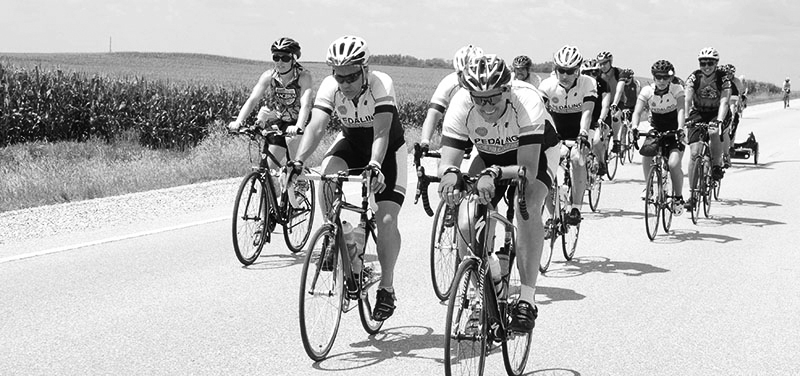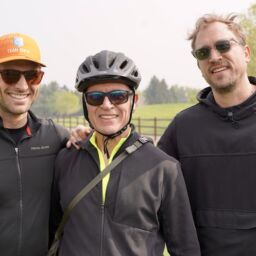In late July 2017, thousands of cyclists, including a 75-person Pedaling for Parkinson’s team, rode the week-long Des Moines Register’s Annual Great Bike Race Across Iowa (RAGBRAI).
What’s the connection between cycling and Parkinson’s?
In 2003 Jay Alberts, PhD, Cleveland Clinic, was riding RAGBRAI on a tandem bicycle with Cathy, a person with Parkinson’s. After they had been riding together for a few days, he noticed a significant improvement in her physical abilities, most notably her handwriting. As Cathy wrote postcards to her family from across Iowa, Dr. Alberts observed that her handwriting became more controlled and legible. This led to Dr. Alberts’ wondering whether exercise, specifically cycling, helped improve function in a person living with Parkinson’s.
This discovery served as the inspiration for a groundbreaking research study by Dr. Alberts and movement disorder neurologist, Dr. Bas Bloem, Radboud University. Funded by the Davis Phinney Foundation, the outcome of this research completely reversed the common practice of prescribing rest for Parkinson’s. Doctors now routinely prescribe physical activity as part of Parkinson’s therapy, leading to a much higher quality of life.
Riding RAGBRAI for Research
This year, the Davis Phinney Foundation joined Dr. Alberts and the Pedaling for Parkinson’s team at RAGBRAI for this 411-mile ride in an effort to raise Parkinson’s awareness and funds to support the Davis Phinney Foundation’s research and programs.
“We’r excited to partner with our friends at the Davis Phinney Foundation,” said Dr. Alberts, captain of the Pedaling for Parkinson’s team. “While Davis’ history in professional cycling is legendary, more importantly, he’s a living example of what it truly means to live well with Parkinson’s.”
Dr. Alberts continues to study how the brain controls skilled movements and how changes in brain function affect the movement performance. In 2015, he was again awarded grant funding from the Davis Phinney Foundation to look at dual tasking (simultaneous performance of two attention-demanding tasks,) and Parkinson’s. This two-year intervention study will use a virtual reality assessment to improve motor and non-motor function in individuals with Parkinson’s. If successful, the study aims to characterize Parkinson’s dual task deficits and develop effective interventions targeting these declines.
TAKE ACTION
BE ACTIVE
“The best evidence for slowing the progression of Parkinson’s is exercise,” says Dr. Benzi Kluger, MD, University of Colorado. Start today by increasing your activity level doing an activity that you enjoy whether it be cycling, playing with your grandchildren or trying out a new wellness class. Dr. Alberts’ research illustrates the importance of intensity in reaping the greatest benefit from exercise. Learn more about incorporating intensity into your workouts in our free video, Parkinson’s Exercise Essentials.
BE INFORMED
Learn directly from Dr. Jay Alberts, PhD, Cleveland Clinic as he discusses the benefits of forced exercise.
BE ENGAGED
Check out the influential living well research that the Davis Phinney Foundation is funding that has the potential to positively impact your quality of life.


















I’m 76 years old. I have Parkinson. I have biked a long time ago.
I don’t have much confidence even getting on a bike.
I am crazy but would it be possible for my wife If I could tandem?
Right now I use the recumbent for an hour indoor. I have done this for several years.
Any advice?
Regards,
Fred
Thanks for commenting, Fred! Balance is a key factor to consider when moving from a stationary bike to a standard, outdoor bike. If you are considering a tandem bike for you and your wife, we would recommend finding a bike shop in your area that has a solid line of tandem bikes. That way you can try out some bikes and see what works for you within your budget and comfort level. Also, ask the mechanics at the bike shop to see which bike would best suit the two of you. We hope this helps!
Does dr Albert need any more study volunteers for the bike study
I currently ride my bike
4-5 times a week and would love to be involved in a study like this
Hi Jody! We are excited that you are interested in getting involved. You can find out more information about participating in Dr. Alberts’ most recent study by emailing our Research Program Manager, Sara Garvey, at sgarvey@dpf.org.
I am a cancer patient and my chemotherapy drug causes chronic edema in my legs. I rode a recumbent exercise bike daily and yearned for a recumbent trike so that I would be able to bike with friends. I finally got a Trigo recumbent trike by Hase and I absolutely love it. While riding in my neighborhood yesterday, a neighbor stopped me. Her husband has Parkinson’s. She asked all kinds of questions about my trike. She had been reading of a French study regarding bicycle riding and Parkinson’s. She wanted me to send her info on where I got my trike. I actually used a shop in Newport, TN called Power On Cycling. The owner is a USAF veteran and he deals mostly in customizing trikes/bikes for disabled veterans, to enable them to participate and compete in adaptive sports. The Trigo recumbent is a “delta” style trike, which means it has one wheel in the front and two in the back. It sits up higher than most recumbents, so it is easier to get on and off. There is no issue with balance, since it has three wheels. Mark Power, the owner of Power On Cycling, even had a tandem version of a recumbent trike. He had customized it for a veteran who is blind. That might be a viable option as well, for someone concerned about balance and the stamina needed for cycling.
I don’t want to sound like a commercial for the bike shop, but I loved dealing with Mark and was so impressed by the work he does for our veterans. He wouldn’t steer you wrong or sell you something you can’t use.
Hi Ruth Anne – Thanks for reading. I’m glad you found something that’s working for you. We have several people in our community who have used Trikes, Catrike specifically, and they love it! Happy riding!